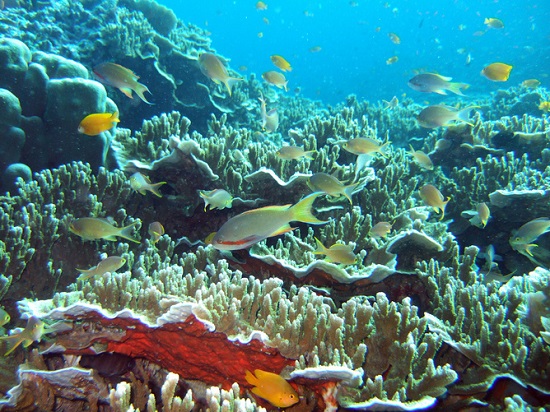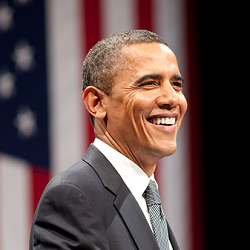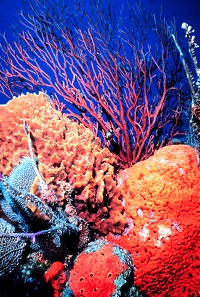That’s the question Leigh Sales should have been asking rather than playing prompt to Julie Bishop’s spin on the 7.30 Report.
I’ve been citing a 2011 study by K. Frieler et al which found that:
preserving more than 10 per cent of coral reefs worldwide would require limiting warming to below +1.5°C (atmosphere–ocean general circulation models (AOGCMs) range: 1.3–1.8°C) relative to pre-industrial levels.
What President Obama and the Chinese are doing is not nearly enough to save the Great Barrier Reef, and there’s a fair chance that Obama knows it.
The ABC news bulletins have simply been repeating the Government lines without asking Opposition spokespeople, let alone scientists. The Guardian did better:
Bishop said on Friday the government did not believe the reef was in danger – a comment that contradicts the scientific consensus that it is.
The 2014 outlook report from the Great Barrier Reef Marine Park Authority said: “Climate change remains the most serious threat to the Great Barrier Reef. It is already affecting the reef and is likely to have far-reaching consequences in the decades to come.”
Radio National’s PM program in a segment not picked up by their news outlets interviewed Dr Jon Brodie from James Cook University who was the lead author of a 2008 scientific report for the Queensland Government on water quality issues affecting the Great Barrier Reef, and last year completed a Scientific Consensus Statement based on the views of more than 50 scientists and policy experts. He cites the Australian Government’s own outlook report 2014 linked above which:
says very clearly that the reef is in poor condition and continuing to deteriorate, and that major actions are needed to stop that deterioration.
Bishop says that the people who look after the reef are following the world’s best practice. Brodie says that’s irrelevant because what they are doing is ineffective:
The reef’s lost half its coral, it’s lost most of its dugong, seagrass is in poor condition. Most of the major indicators of the reef are in a serious state and serious state of decline. And hence, whatever management we are doing now, whatever standard it is, it’s not enough.
The Queensland and Federal governments have come out with a draft Reef 2050 Sustainability Plan to address the reef’s decline but Brodie describes it as “very weak”.
The bottom line?
the Government’s own report on the reef, very clearly says that climate change is a major issue for the reef. And if we don’t do anything about it, somebody doesn’t do something about it, then there’s not really a lot of hope to have the reef restored to its, you know, good value.

The SMH asked several scientists including Brodie, Dr Ove Hoegh-Guldberg, Director of the Global Change Institute at The University of Queensland and Dr Charlie Veron, a former chief scientist at the Australian Institute of Marine Science.
Ove Hoegh-Guldberg was involved in the Frieler research cited above and stressed the dangers of ocean acidification. In 2012 he wrote an article for The Conversation pointing out the inappropriateness of the 2°C guardrail for preserving coral reefs.
Veron was blunt:
“In the long term, that is the whole of this century, we are going to have the Great Barrier Reef slaughtered,” Dr Veron, a world authority who has scientifically named about one-quarter of all known corals, said.
“There’s no doubt about that at all, if carbon-dioxide emissions keep on tracking as they are.”
Currently UNESCO is undertaking a review of the Great Barrier Reef’s World Heritage status, due for completion by mid-2015.
Both Brodie and Veron see the Queensland and Australian governments in a frenzy to head off an ‘endangered’ listing. It was pointed out on the ABC Insiders program that such a listing would inhibit the financing of planned developments.
Obama is right to worry what his granddaughters will see if they come to visit. It’s possible there will still be something worth crossing the Pacific for. Chances are, however, that his great granddaughters will stay at home.
It’s all very simple really – Government spin versus very real concern by scientists, a threat to UNESCO World Heritage listing with flow-on effects on development, and international goals for a 2°C guardrail which will see the reef destroyed.
 Thomas Frank has recently been in Australia, spruiking his book Listen, Liberal or Whatever Happened to the Party of the People. He told Richard Fidler that
Thomas Frank has recently been in Australia, spruiking his book Listen, Liberal or Whatever Happened to the Party of the People. He told Richard Fidler that 
 “Yes we can. Yes we did.” But did he?
“Yes we can. Yes we did.” But did he?


